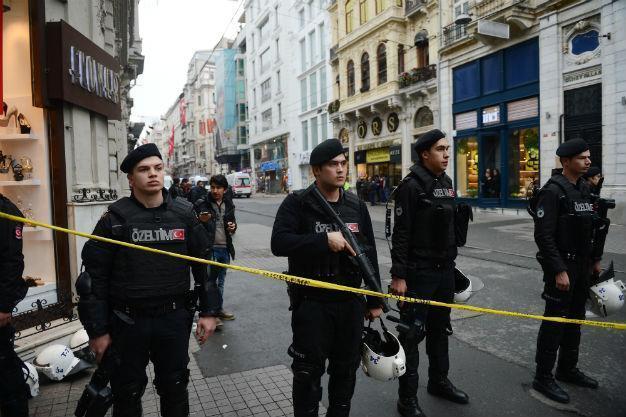Five killed, 39 injured in suicide attack in central Istanbul
ISTANBUL

AA photo
Five people were killed and 39 others were injured in a suicide bomb attack on March 19 in central Istanbul, on the busy İstiklal Avenue in Taksim.
All victims of the attack besides attacker were foreign nationals: Israeli citizens Simha Siman Demri, Yonathan Suher, Avraham Godman and Iranian Ali Rıza Khalman.
Turkish Health Minister Mehmet Müezzinoğlu said 39 people, including 24 foreign nationals and a child, were injured, and seven of the victims in hospitals were in critical condition.
"We as a nation are unfortunately now face to face with a situation of unlimited, immeasurable acts that are inhumane, defy human values and are treacherous," Müezzinoğlu said.
Turkish Prime Minister Ahmet Davutoğlu condemned the "inhuman" attack in a written statement, extending his condolences to the families of victims and wished the injured a speedy recovery.
"On behalf of my country, nation and government, I condemn the murderers who committed this atrocious attack which directly targeted people without any discrimination, as well as all traitors who supported and instigated them to carry out such an inhuman act," Davutoğlu said.
He added that messages of condemnation pouring in from everywhere proved that the whole world was beginning to see terrorism's "real face," which targeted "all humanity and the people's right to life."
He also vowed that Turkey would continue its fight against terrorism with the same determination "until it is completely eradicated."
There was no immediate claim of responsibility for the attack on part of İstiklal Avenue, a long pedestrian street lined with global shops and foreign consulates, a few hundred meters from an area where police buses are often parked.
Two Turkish officials told Reuters evidence suggested the attacker was likely from the outlawed Kurdistan Workers Party (PKK) or the Islamic State of Iraq and the Levant (ISIL).
One of the officials said the bomber had planned to hit a more crowded spot.
"The attacker detonated the bomb before reaching the targeted point because they were scared of the police," the official said, declining to be named because the investigation is ongoing.
The pedestrian street was completely sealed off after the attack.
Turkey's Supreme Board of Radio and Television (RTÜK) imposed a temporary ban on broadcasting pictures and video footage from the scene of the attack.
According to a statement from the board, the ban includes live broadcasts from the blast site, footage from the time the blast took place and afterwards, and showing images of bodies.
Germany, which kept its embassy in Ankara and consulate in Istanbul closed on March 17 and March 18 upon on an intelligence of a terror attack threat, warned its citizens in Istanbul after the attack to stay in their hotels and follow the media for security updates.
Skin, the lead singer of the world-renown British band Skunk Anansie, was among the witnesses of the attack.
“Massive bomb blast outside our hotel, I'm ok, very shaken, people dead, awful scenes,” the singer wrote on her official Twitter account.
The attack in Istanbul came six days after a suicide car bomb attack in the heart of the capital city of Ankara, which killed 37 people.
The attack in Ankara was claimed by the Kurdistan Freedom Hawks (TAK), a terror group linked to the outlawed PKK.
The group described the car bombing, which occurred on March 13, as “vengeful action” for security operations against the PKK militants in town centers in the southeast that have been underway since July.
TAK previously claimed responsibility for a separate car bombing in Ankara last month that killed 29 people.
In January, a suicide bomber killed around 10 people, most of them German tourists, in Istanbul's historic heart, an attack the government blamed on ISIL.
